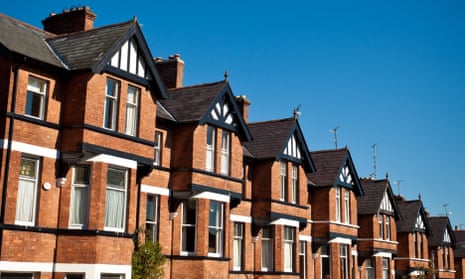House prices in the UK are growing at the fastest annual rate in 17 years, with all regions picking up, according to Britain’s biggest building society.
The average price of a UK home rose 0.7% in June from May to £245,432, taking the annual rate to 13.4% – marking the highest annual growth rate since November 2004, said Nationwide building society in its monthly report.
Britain’s housing market has been boosted by the extension of government tax breaks for homebuyers and an exodus from big cities such as London, with movers seeking more space and leafier locations after the experience of working from home during the Covid-19 pandemic.
Robert Gardner, the Nationwide chief economist, said: “While the strength is partly due to base effects, with June last year unusually weak due to the first lockdown, the market continues to show significant momentum. Indeed, June saw the third consecutive month-on-month rise, after taking account of seasonal effects. Prices in June were almost 5% higher than in March.”
Northern Ireland and Wales recorded the strongest gains in the second quarter, at 14% and 13.4% house price growth respectively. Scotland posted the weakest house price growth at 7.1%, closely followed by London at 7.3%.
The outer metropolitan region around the capital, including commuter towns such as Luton, Watford, Sevenoaks and Woking, recorded annual growth of 8.2%.
The outer south-east region, which includes cities such as Brighton and Hove, Oxford, Winchester and Southampton, posted gains of 10.9%, the first time the area has recorded double-digit growth since 2014. In the south-west, house price growth reached its highest level since 2010, with prices up 10.4% year on year.
Despite the record house prices, Gardner said, typical mortgage payments are not high by historic standards compared with take-home pay because mortgage rates remain close to all-time lows, with the Bank of England’s base rate at 0.1%.
However, first-time buyers continue to struggle to save enough for a deposit, as house prices are close to a record high relative to average incomes. A 10% deposit is more than 50% of a typical first-time buyer’s income. A potential buyer earning the average wage and saving 15% of take-home pay would take five years to raise a 10% deposit.
The Bank of England’s outgoing chief economist, Andy Haldane, recently said the market was “on fire” and that the dramatic price gains were very likely to worsen inequality between the better-off, many of whom have accumulated savings during the pandemic, and younger people.
The chancellor, Rishi Sunak, cut the stamp duty tax on property purchases last summer to reverse a slump in property sales at the start of the pandemic. He extended the temporary tax cut in March’s budget to the end of June.
Andrew Wishart, a property economist at Capital Economics, said: “There is little sign of market dynamics changing suddenly when the stamp duty threshold is reduced from £500,000 to £250,000 in July, despite the maximum possible saving dropping from £15,000 to £2,500. Searches for the property portals Rightmove and Zoopla are not far below their April peak.”
Tom Bill, the head of UK residential research at the estate agents Knight Frank, said: “We expect UK house price growth to slow down after the summer, declining to mid-single digits by the end of 2021 as more supply comes through. The winding down of the stamp duty holiday and return to a sense of normality will encourage more sellers to list their property and greater balance to return.”
Jeremy Leaf, a north London estate agent, said: “On the ground, we know that many of the buyers agreeing sales were not able to take advantage [of the tax break] so there is still plenty of life remaining in the market, even though demand has moderated after the frenzy of the previous few months.”
